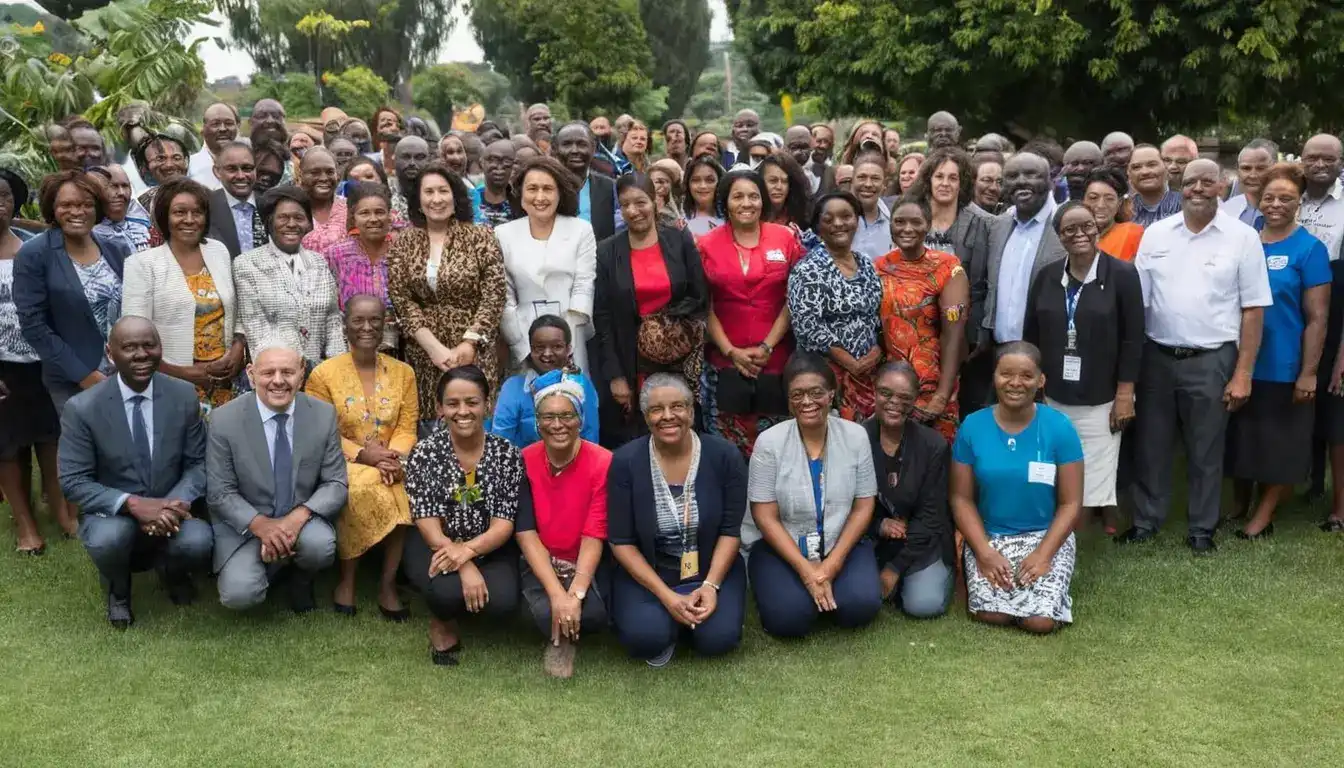Tips for Creating a Positive and Productive Work Culture
Emily Willis

Photo: Tips for Creating a Positive and Productive Work Culture
A positive and productive work culture is essential for the success of any organization. It's the foundation upon which employees can thrive, grow, and contribute to the company's goals. However, creating a positive work culture is not a one-time task; it requires continuous effort and dedication. In this article, we'll explore the essential tips for creating a positive and productive work culture that benefits both employees and the organization.
Understand the Importance of Work Culture
Before we dive into the tips, it's essential to understand the importance of work culture. A positive work culture can lead to increased productivity, improved employee morale, and better retention rates. On the other hand, a toxic work culture can lead to decreased productivity, high turnover rates, and a negative impact on the organization's reputation.
1. Plan Social Outings
Humans are social beings that crave interaction. Creating opportunities for employees to interact with each other outside of work can foster meaningful relationships and a sense of community. Plan social outings, such as team lunches, happy hours, or volunteer events, to encourage employees to bond and build relationships.
2. Maintain Clear and Consistent Expectations
Consistency is key to creating a positive work culture. Employees need to know what's expected of them and what the rules are. Clear and consistent expectations can help reduce confusion, improve productivity, and increase employee satisfaction.
3. Create Listening Posts
Listening posts are essential for creating a positive work culture. They provide a platform for employees to share their concerns, suggestions, and ideas. Create listening posts, such as regular town hall meetings, anonymous feedback systems, or employee surveys, to encourage open communication and feedback.
4. Build Psychological Safety
Psychological safety is critical for creating a positive work culture. It's the feeling of being safe to share ideas, take risks, and be vulnerable without fear of judgment or retribution. Build psychological safety by encouraging open communication, providing feedback, and recognizing and rewarding employees for their contributions.
5. Watch Trends
Creating a positive work culture is an ongoing process. It's essential to watch trends, such as employee turnover rates, engagement surveys, and retention rates, to identify areas for improvement. Use data to inform your decisions and make adjustments to your strategies as needed.
6. Lead by Example
Leadership sets the tone for the organization's culture. Leaders must model the behaviors and values they expect from their employees. Lead by example by demonstrating empathy, transparency, and accountability.
7. Foster Open Communication
Open communication is essential for creating a positive work culture. Encourage open communication by providing regular updates, sharing information, and seeking feedback from employees.
8. Recognize and Reward Employees
Recognizing and rewarding employees can boost morale, motivation, and productivity. Develop a recognition and reward system that acknowledges employees' contributions and achievements.
9. Emphasize Work-Life Balance
Work-life balance is critical for creating a positive work culture. Encourage employees to maintain a healthy work-life balance by providing flexible work arrangements, paid time off, and employee wellness programs.
10. Celebrate Milestones
Celebrating milestones, such as work anniversaries, birthdays, and years of service, can boost morale and motivation. Develop a recognition program that celebrates employees' milestones and achievements.
11. Provide Opportunities for Growth and Development
Providing opportunities for growth and development can increase employee engagement and retention. Develop a training and development program that provides employees with the skills and knowledge they need to grow and succeed.
12. Conduct Regular Feedback Sessions
Regular feedback sessions can help identify areas for improvement and provide employees with the feedback they need to grow and succeed. Conduct regular feedback sessions, such as performance reviews, to provide employees with constructive feedback and coaching.
Conclusion
Creating a positive and productive work culture requires continuous effort and dedication. By understanding the importance of work culture, planning social outings, maintaining clear and consistent expectations, creating listening posts, building psychological safety, watching trends, leading by example, fostering open communication, recognizing and rewarding employees, emphasizing work-life balance, celebrating milestones, providing opportunities for growth and development, and conducting regular feedback sessions, you can create a work culture that benefits both employees and the organization.
Latest ✨
View AllArtificial Intelligence (AI) has evolved rapidly from science fiction to reality, offering immense potential but also presenting significant ethical challenges.
Emily Willis
Virtual reality (VR) and augmented reality (AR) are transforming the entertainment industry by offering immersive experiences that blur the lines between the real and virtual worlds. VR completely transports users into computer-generated environments, while AR overlays digital elements onto the real world.
Emily Willis
In today's job market, academic qualifications alone are not enough for success. Employers value soft skills such as communication, leadership, and teamwork. Educational settings provide opportunities for students to develop these skills. Strong communication skills enable effective collaboration and understanding. Presentation and public speaking skills enhance professionalism and credibility. Leadership skills involve setting goals, making decisions, and inspiring others. Teamwork skills are important for building relationships and achieving shared goals. Developing these skills in an educational environment prepares individuals for successful careers by enhancing employability and job readiness. Soft skills development is an ongoing process that promotes continuous learning and growth. By emphasizing the importance of soft skills, educational institutions empower students to succeed in a complex and interconnected world.
Emily Willis
fostering a love of reading in early childhood and provides practical tips to achieve this. It emphasizes starting early, making reading fun and interactive, integrating reading into daily activities, and addressing challenges with reluctant readers.
Emily Willis
Business
View All
August 5, 2024
The Importance of Having Insurance to Protect Yourself and Your Assetsinsurance in protecting individuals and businesses from financial losses due to unforeseen events. It explains the different types of insurance available, such as health, life, auto, homeowners, renters, disability, and liability insurance, and their benefits.
Emily Willis

August 5, 2024
How to Create Engaging Content and Convert Visitors to Customerscreating engaging content to attract and retain customers in the digital age. It provides strategies for understanding the audience, setting content goals, creating high-quality content, using storytelling and emotional connection, and optimizing content for conversions. It also covers content formats and distribution, measuring and analyzing content performance, and building relationships with influencers and user-generated content.
Emily Willis

August 4, 2024
How to Build a Strong Brand Identity for Your BusinessBuilding a strong brand identity is essential for business success as it helps differentiate you in the market, connect with your audience, and build loyalty. Key steps include understanding your target audience, defining your mission and values, developing a unique selling proposition, creating a memorable brand name and logo, choosing brand colors and typography, crafting a brand voice and messaging, ensuring a consistent brand experience, leveraging visual content.
Emily Willis
Economy
View Allchallenges and opportunities presented by economic uncertainty and explores strategies that governments and businesses can implement to mitigate risks, ensure stability, and pave the way for future success.
Read MoreGlobal inequality refers to the unequal distribution of wealth, income, and opportunities across the world, leading to economic, social, gender, and regional disparities. The consequences of this inequality are widespread, impacting social unrest, political instability, economic stagnation, and environmental degradation.
Read MoreDiscover the hidden connections that drive global stock markets. Explore stock correlations, their impact on diversification and risk, and how to calculate them. Learn how to apply this knowledge to your investment strategy and uncover secrets to making more informed decisions.
Read MoreEntertainment
View All
August 5, 2024
Music Universal Language: Connecting and Inspiring Across CulturesMusic has the power to transcend language barriers and connect people on a deep emotional level. It serves as a bridge between cultures, fostering understanding and appreciation for diversity. The universality of rhythm and melody creates a sense of unity, while the diversity of musical styles allows for exploration and creativity.
Emily Willis

August 4, 2024
Virtual Music Concerts: The Future of Live Performance?The music industry has seen significant changes in recent years, with virtual music concerts becoming a popular trend, especially due to the impact of the COVID-19 pandemic. Technological advancements have made virtual concerts more accessible and cost-effective, while also reducing the environmental impact of live events. However, challenges such as technical issues and the lack of physical presence remain. The future of virtual concerts may involve hybrid models that combine virtual and physical experiences, as well as continued technological innovation to enhance the quality of virtual performances. Building a sense of community and engagement will also be crucial for the success of virtual concerts moving forward.
Emily Willis

August 4, 2024
The Latest Music Trends, Artists Influencing Pop Culture, and How Digital Platforms Facilitate the Distribution of Music GloballyThe music industry is constantly changing due to consumer preferences, technology, and the influence of artists. Digital platforms have revolutionized music creation, distribution, and consumption, leading to genre fusion, the rise of independent artists, and collaborative projects. Influential artists like Billie Eilish, BTS, and Taylor Swift have shaped pop culture globally. Streaming services, social media, and direct-to-fan engagement have transformed music distribution. Digital platforms also promote cultural diversity and inclusivity, expand markets and revenue, and drive technological advancements. The industry is also focusing on sustainability and ethical practices. To succeed in the future, stakeholders must embrace digital transformation and champion inclusivity.
Emily Willis
Health
View AllA healthy lifestyle is crucial for enhancing overall quality of life in today's fast-paced world. It involves habits such as a nutritious diet, regular exercise, adequate sleep, stress management, and avoiding harmful substances. Benefits include improved physical health, enhanced mental well-being, increased energy levels, better sleep quality, and longevity. Implementing healthy habits gradually, staying consistent, seeking support, and monitoring progress are key steps towards a healthier lifestyle. Prioritizing a healthy lifestyle is not just about adding years to life but about adding life to years, leading to a more fulfilling and vibrant life.
Emily Willis
cultivating healthy lifestyle habits to improve overall well-being. It focuses on three pillars of well-being: nutrition, exercise, and sleep. It provides tips on how to incorporate these practices into daily routines, such as eating a variety of foods, finding enjoyable forms of exercise, and establishing a consistent sleep schedule.
Emily Willis
Heart disease is a leading cause of death globally, but early detection and prevention strategies can reduce its impact. This article discusses the importance of early detection, common risk factors, preventive measures, and lifestyle changes for heart health. Understanding heart disease, recognizing symptoms, and undergoing regular screenings are crucial. Common risk factors include high blood pressure, high cholesterol, diabetes, smoking, obesity, physical inactivity, and family history. Symptoms of heart disease include chest pain, shortness of breath, fatigue, irregular heartbeat, and swelling. Diagnostic tests and screenings include blood pressure measurement, cholesterol screening, blood glucose test, ECG, stress test, and imaging tests. Preventive measures include adopting a heart-healthy diet, regular physical activity, quitting smoking, managing stress, maintaining a healthy weight, and limiting alcohol consumption. Medications and treatment options may be necessary for individuals at high risk or diagnosed with heart disease.
Emily Willis
Trending 🔥
View All
2
3
4
5
6
7
9
10
Lifestyle
View AllSports
View AllAugust 4, 2024
The Importance of Mental Training and Psychological Strategies in Helping Athletes Reach Their Peak Performance on the Field
Read MoreAugust 5, 2024
Celebrating Sports Legends: Honoring Iconic Figures and Their Enduring Impact
Read MoreTechnology
View All
August 4, 2024
The Future of Artificial Intelligence: Opportunities and Challenges
opportunities and challenges presented by Artificial Intelligence (AI) in various sectors such as efficiency, customer experiences, healthcare, education, and economic growth. It highlights the need to address ethical considerations, job displacement, privacy issues, security risks, and regulatory challenges associated with AI.

August 4, 2024
Bridging the Digital Divide: Ensuring Everyone Has Access to Technology
we can bridge this gap and create a more inclusive digital landscape.

August 4, 2024
The Role of 5G Technology in Revolutionizing Communication
The introduction of 5G technology is set to revolutionize communication by offering faster speeds, lower latency, and increased capacity for connecting devices. This technology will impact various sectors such as healthcare, transportation, and entertainment. 5G enhances communication through faster speeds, lower latency, and increased capacity, enabling applications like remote surgery, autonomous vehicles, and high-quality streaming.

August 4, 2024
Role of Cloud Computing Technology in Modern Business
Cloud computing technology has become essential for modern businesses, offering cost efficiency, scalability, and flexibility. It enables streamlined processes, enhanced productivity, and improved collaboration among employees. Cloud computing also ensures data security, disaster recovery, and business continuity. By migrating to the cloud, businesses can streamline IT operations, enhance customer experiences, access advanced technologies, and reach a global audience. Real-world applications of cloud computing include e-commerce, healthcare, financial services, manufacturing, and education.





















